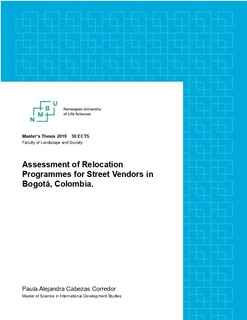| dc.description.abstract | The informal sector causes controversy in countries, especially in developing countries where there is no efficient control. This sector of the economy is characterized by avoiding paying taxes and operating under the radar. Tax evasion generates deficits in countries' budgets, but it is undeniable that this sector offers other opportunities for a part of the population and boosts the national economy.
In Colombia, rural-urban migrations generated a surplus population with low educational levels. The migrating population faced labour pressures and were forced to look for other economic alternatives. Hence, street sales became more and more notorious in the cities. Initially, the government tried to prohibit these activities. But after, they noticed that these new activities were contributing to fighting poverty and unemployment.
The cities grew massively and therefore, governments attempted to implement policies to regulate street vendors. Regulations are difficult to implement because street-vending is accepted as a form of work, but they are occupying public space and exploiting it for personal benefit. Furthermore, street vendors foment congestion and the deterioration of cities and have been linked to mafias and illegal activities.
For the purpose of controlling these activities, governments have ineffectively implemented relocation and training policies. This is why the current administration has a big challenge and changed its approach. The Institute for Social Economy included street vendors in the designing phase to understand the dynamics of the streets and be able to implement costeffective activities that meet beneficiaries’ demands.
In light of the above, these policies seek not only to reclaim public space but also to offer an improvement in their living conditions. Therefore, the objective of the thesis was to assess the relocation programs and determine success or failure factors according to the perceptions of the participants. From a sample of 116 participants, it was identified that programs that offer added value performed better. Additionally, results show that an increase in income does not represent an improvement in the general welfare. Consequently, non-economic factors should be applied in future programmes. | nb_NO |

